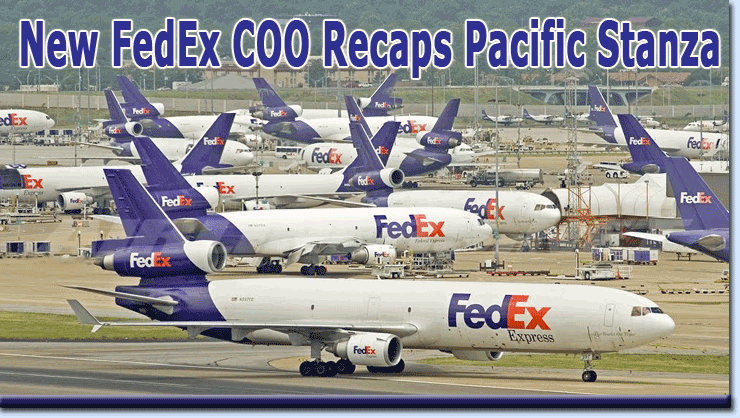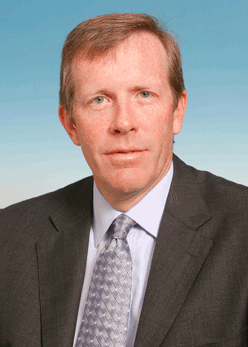 FedEx
serves as regional hub at Baiyun International Airport in Guangzhou, China. FedEx
serves as regional hub at Baiyun International Airport in Guangzhou, China.
In a final interview
conducted before yesterday’s announcement of his promotion from
his current role as president of FedEx Express Asia Pacific to company
chief operating officer, David L. Cunningham, Jr., explained to FlyingTypers
his view of the company’s APAC strategy…
Exactly 30 years
ago, FedEx started laying the foundations of its Asia Pacific business
when it bought the courier company Gelco and opened its own operations
in China and Japan. From small beginnings come great things.
Since then the Memphis-headquartered express
and logistics goliath's searing ambition has built a powerful AP footprint.
Managed from regional headquarters in Tokyo, Shanghai, and Singapore and
with operations centered on its APAC hub at Guangzhou Baiyun International
Airport in China, FedEx Asia Pacific offers 400 flights per week, runs
3,900+ vehicles, and employs over 18,000 people in more than 30 territories
and countries.
 Last
year FedEx expanded its facility at Beijing Capital International Airport
to increase its handling capacity for international shipments, and in
April this year the company commenced operations at its new North Pacific
Regional Hub at Kansai International Airport in Osaka, Japan. Last
year FedEx expanded its facility at Beijing Capital International Airport
to increase its handling capacity for international shipments, and in
April this year the company commenced operations at its new North Pacific
Regional Hub at Kansai International Airport in Osaka, Japan.
According to David Cunningham, Jr., president
of FedEx Express Asia-Pacific, APAC will continue to be central to the
company’s ambitious global growth plans in the years ahead. “If
you look at Boeing’s forecasts, Asian air freight lanes to major
markets are expected to be the fastest growing lanes and that’s
expected to continue for the next 20 years,” he told FlyingTypers.
“For example, China’s trade with the ASEAN bloc is now up
to 37 percent of ASEAN’s overall trade, from 26 percent in 2000.
And trade within Asia accounts for 25 percent of Asia’s total US$6
trillion annual exports.
“So, of course, Asia is very important.
We expect it to be one of the fastest growing markets. Outside of the
region, Mexico is expected to grow rapidly, but India should be a good
market. China will stay on track and in South East Asia we see a lot of
potential in Vietnam, Thailand, and the Philippines.”
Tapping into this growth, the company plans
to expand its footprint across the region, most notably by opening a new
FedEx Shanghai International Express and Cargo Hub in China, a development
slated for completion in early 2017. The Hub will be able to process up
to 36,000 documents and parcels per hour and meet expansion requirements
for the next 20 years and beyond.
According to Cunningham, strategizing how
to serve Asia is about understanding how and why the region and its component
parts are rapidly evolving. For example, he sees rising costs and the
rapid urbanization of China creating new markets and challenges and also
opportunities—both in inland provinces of China and also in manufacturing
centers in locations outside the country.
“The Chinese economy is moving towards
one led by domestic growth, so that’s a tremendous and healthy shift.
Part of that is because of the need to move manufacturing and services
more inland and away from the coast.
“We’ve been in these inland
markets such as Chengdu and Zhengzhou for a long time so we have the ability
to meet those needs. We will continue to see as China urbanizes that this
creates more and more inland markets.
“We now serve 400 cities there through
our domestic express service and operate aircraft around the country as
well as deferred trucking options for economy business. So we are well
positioned to expand domestically and internationally.
“But China is also a more expensive
place to do business and distribute than it was, so countries like Vietnam
and other places in the South East are benefitting from this.”
Cunningham sees huge potential in India
and also encourages the new President of Indonesia, Joko Widodo, to embrace
policies that promote trade and investment rather than discourage it.
“I’ve been in the APEC [Asia
Pacific Economic Cooperation] conference for the last few days and a big
part of this is about trade facilitation and promotion,” he explained.
“There are a number of agreements under discussion and they are
all about making it easier for goods and services to flow across borders,
which facilitates job and wealth creation.
“With around 300 million people, Indonesia
has tremendous resources, great natural resources, etc. But it lacks infrastructure,
which makes it difficult to manufacture or distribute there.
“They have also rolled back on plans
to open markets so companies like FedEx can come in.”
Cunningham, like so many others, believes
Indonesia lacks the roads, airports, and policies that will enable the
country to truly take its rightful place on the global trading map. “Infrastructure
is important, but it takes a long time,” he added. “Policy
restructuring can create a lot of capacity within what’s already
available so what you have is more efficient and automated.
“Indonesia still only represents a
small part of Asian trade and this is mainly linked to natural resources.
So that’s a missed opportunity for the country. It’s harder
to invest there for foreign companies. FedEx and other companies would
love to see progress on this front.
“By all accounts, President Joko Widodo
is a dynamic young leader, so I hope he reverses this pattern. Indonesia
needs new legislation and laws to reduce protectionism and create transparency.
“There’s a lot that can be done
with a few strokes of a pen.”
SkyKing |





